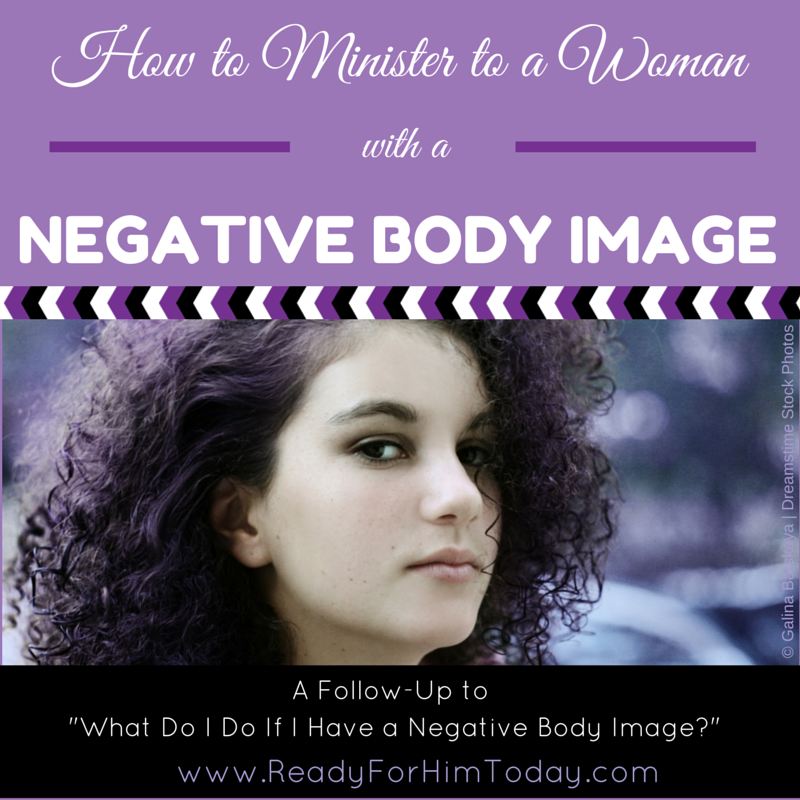Remove appearance-based comments from your vocabulary.This means, don’t ask your friend, “Does this shirt make me look fat?” Ask if the shirt is modest or appropriate, but don’t relate the shirt to how it affects your body. Suppose you are a friend to Frances, who struggles with a negative body image. If you say “You look so good these days, Frances!” it is a confirmation to her that (A) she didn’t look so well in the past and (B) whatever steps she is taking now to look this way are working. Instead, compliment her on something about her appearance that she cannot change through damaging habits. “Frances, I love your smile. Frances, those natural highlights in your hair are so attractive!” Better yet, compliment her on her character: “Frances, your compassion is so beautiful to see. Your maturity in dealing with that difficult situation was so impressive.” Encourage her to wear looser clothing.I suggested to a woman once that she should not step on a scale. “That’s not the problem,” she replied. “Even when I don’t weigh myself, I still evaluate myself based on how I look in the clothing I want to wear.” Many women who struggle with negative body image have unrealistic expectations for their bodies, and they wear clothing that fits those expectations: in other words, tight or undersized clothing. It is impossible for her to wear leggings or tight shirts without noticing all sorts of lumps and bumps. The muffin top that bulges over her pants will make her look roly-poly, when the real problem is that her pants are too tight. Encourage her to wear clothing that actually fits her. It will be hard. She won’t want to give up on her teeny shirts and squeezy pants. She’ll say her leggings are more comfortable than that decent pair of pants, but if you model appropriate attire well, and continue to praise her better clothing choices, she may eventually learn that she actually looks her best when she wears clothing that fits her. DOn't guess her weight.If you guess too high, she’ll assume you think she is fat. If you guess too low, she’ll mentally tally up how many pounds she’ll have to lose for her to fit the “ideal” that you just inadvertently suggested. Sometimes the “Frances” in your life will encourage you play that guessing game, in a sort of passive-aggressive effort to figure out how she is perceived by other people. Don’t fall for it. Instead, encourage her to think in terms of a healthy lifestyle characterized by moderation in all things. My own storySometimes women with negative body image will protest that their real intent is to be healthy, not to reach an ideal weight, yet their words and focus will reveal otherwise. At one time, I was ten pounds heavier than I wanted to be. Wearing clothing a size above what I wanted to wear was discouraging, and I felt like everyone noticed my flabby rear and thunder thighs (which, in reality, were perfectly fine).
I convinced myself that it was a matter of health, not of negative body image. “I just want to be healthy and fit! My BMI is too close to the red zone!” Yet no matter what I did, I could not reduce my weight. Then, my schedule changed and with more consistent exercise, sleep, and diet, I was able to shed some weight. But I still could not reach my ideal. It took me a long time to realize that my ideal was unrealistic. I was healthy and active at my present weight. Losing a few more pounds would not significantly increase my running speed or my physical strength, or reduce my naturally wide hips. A woman’s true ideal weight is usually about ten to twenty pounds heavier than she thinks. If she can learn to think in terms of “ideal ability to perform” or “ideal balance of healthy habits” versus “ideal weight” or “ideal appearance in a particular size or type of clothing” then she’ll be on her way to a better mindset.
1 Comment
2/12/2020 02:08:28 am
We need to accept the fact that we are all different and these differences should be embraced by no other than ourselves! Yes, we are imperfect but we were created this way and we need to see the beauty in ourselves. We should never compare ourselves to other people because that's the easiest way to depression. We don't want to end up self- pitying just because we did not reach the standards for ourselves. In terms of appearance, we should see ourselves less than others.
Reply
Leave a Reply. |
Meet YaashaNone of my life has gone the way it was "supposed to go," but I don't love my life any less because of the hardships and new directions. I see so much unexpected good in it, and I want others to see the good in theirs. Archives
May 2020
Categories
All
|


